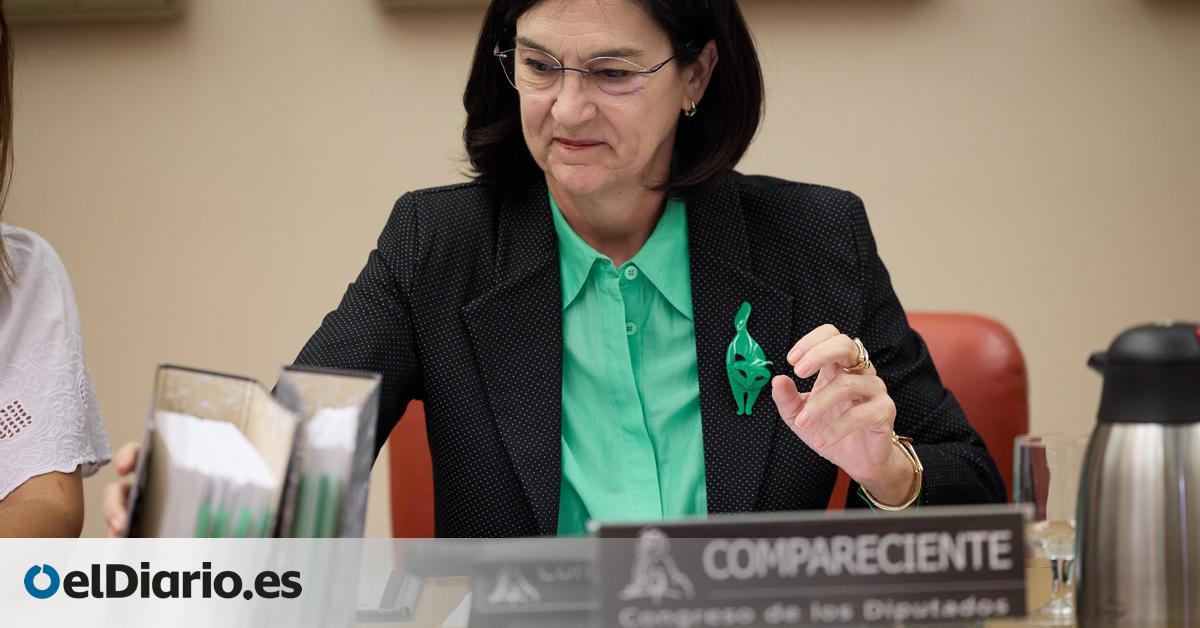
The president of the National Commission of Markets and Competition (CNMC), Cani Fernández, said on Tuesday in Congress that if the agency has not approved the change of a rule that the regulator itself qualifies as “obsolete”, and that would allow renewables to regulate tension, it has been by indication of the EU, which transferred to the body that did not adjust to the European regulations, which forced it to rehearse it in a “Pilot project.”
As Eldiaria.es, Red Eléctrica (Ree) advanced in 2021 to the CNMC that approved a “voltage control service” in the peninsular system that, after two pilot projects, the CNMC did not take to consult until last November and that would allow the renewables to act “in the face of extreme values” of tensions in the network and the high penetration of renewables from which the system operator (REE) already warned 2020, when he released that new service to public consultation.
Fernández has explained to the deputies that the operation procedure for the voltage control “is in force and mandatory”: for all synchronous generators (hydraulic, gas, coal, nuclear) in the electrical law and for the renewables, by virtue of a decree of 2014. “What asks us at the time Red Electrica” is the “possibility” of establishing a regime “that accompanies” with “economic nature”. But, he states, since there is that consideration, the EU tells them that “it does not fit” and they have to do a pilot project (“Sandbox”) to “see how it works.”
The regulations, according to regulator sources, will approve “probably this month.” But Fernández stressed that providing that service “is not immediate” and “requires equipment.” Renewables today cannot “support” tension control and need investments to do so, something that “will take their time.”
In his appearance in the Commission of Economy, Commerce and Digital Transformation to present the plans and actions of the agency and account for the information about the historical blackout of April 28, Fernández has announced the opening of an informative file, independent of the investigation that an interministerial commission is carrying, to clarify “responsibilities” and, where appropriate, “proposals for improvement”, and explained that the CNMC will publish a report.
To find breaches of the electrical law, he recalled, the fines of the CNMC can be up to 60 million euros, if it is a “very serious” infraction and “regardless of the particular compensation that each affected can be claimed.”
Fernández has not contributed light on what caused the blackout whose causes “to date, they are not known.” “You have to analyze the entire chain, from the generators to the last energy plaintiff.” “The complexity of the analysis is considerable”, more when they must “propose measures” and “sanction those responsible.” The report published by the agency may not limit itself to the electricity field since, he recalled, the blackout seriously affected telecommunications, transport and other essential services that are also its competence.
The president of the ‘super -regulator’ has stressed that “zero risk never exists” and the question is “the cost you want to assume” in networks or storage, that “we pay us in our invoice.” With greater interconnection with France, “another rooster would have sung.” The cyber attack “neither discarded it nor confirm it” because “I am not responsible.”
Fernández explained that CNMC’s investigation is “totally independent” of government and other agencies. Not leading the interministerial committee and appearing as “guest” is “logical” because that body has been created under the National Security Law.
“No anomaly”
At the beginning of his appearance, he has reviewed what is known about the “very serious” blackout, an “exceptional” nature that occurred after a “generalized destabilization of the electricity grid whose causes are being investigated”, in a day of high renewable production but without “no anomaly or particularity that can alone explain the incident.”
He has said to ignore which centrals were disconnected and explained that the market cassation that Red Eléctrica (REE) validated the eve “was being executed correctly”, with a “mixed generation mix” in spring: high penetration of renewables, “quite hydraulic”, operational nuclear and a “rather low” demand, with the system “in export mode” to France, Moroccan and Portugal.
Fernández explained that at the time when the interconnection with France jumped, the system worked at 48 Hercios (the frequency that the network needs are 50 tools). He pointed out that the non -renewable synchronous generation, which “in principle gives greater security”, “exceeds the previous days” to the cut, with a “low” weight of the nuclear but “above other nearby days”, “six cycles” (natural gas), a coal central, in addition to hydraulic. The renewables produced with “high values” but “lower” to the maximums of the photovoltaic on the 14th, 15, 19, 24 and 26 April.
He pointed out that the 6 months that the European Association of Transporters Entso-E has to have its conclusions about the blackout “are not a coincidence”: we must analyze “millions of data with a tremendous granularity.” Its final report is expected for “September 2026”. This Monday the CNMC participated in the first meeting.
Fernández has indicated that “it is very difficult for a zero to have occurred” if the reason were a lack of investment in the networks. As for the financial compensation rate that the CNMC is analyzing for the sector “we are still discussing it” but “in no case” will be less than 5.58% that was set in 2019 for six years. In the CNMC they are “very aware” that this investigation coincides with the definition of the next regulatory period of the electricity and gas sector and transport or distribution, “possibly the most intense moment that the CNMC has”. Despite the “unforeseen overload” and the “limited resources”, they hope to fulfill the calendar.
The president of the CNMC has pointed out that she has no “news” on the recovery project of the extinct National Energy Commission (CNE), which has been processed by Congress for months: “It is in her hands, lordships.”
He has also referred to BBVA’s public acquisition offer (OPA) on Banco Sabadell, whose opinion has been taken with “technical rigor” and commitments “provided and sufficient,” he defended. He also explained that “in 2026” the study on land and housing announced a few months ago will be approved.
In his initial appearance, he has launched a “final reflection” on the challenges facing institutions, including regulators, which is “essential” that they are “strong and effective”, “solid”, with “independence, transparency and quality of action” to have a “prosperous” economy.
Source: www.eldiario.es

